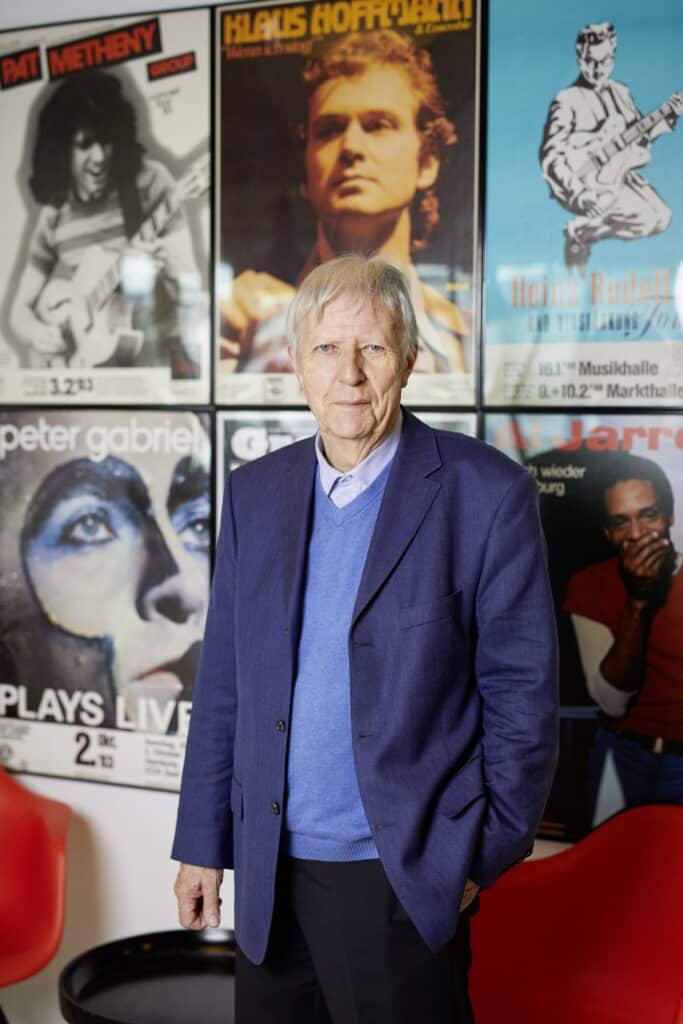Features
Graduating From ‘The School Of Karsten’ – How Ben Mitha Is Leading His Grandfather’s Concert Agency Into The Future

There were moments during these past two-and-a-half years when Ben Mitha asked himself, why he was still doing this? Why rack his brain to come up with a safe event, only to have it rejected by some local authority at the eleventh hour? Why lose sleep over a well-thoughtout station concept, only to have politicians and media demonize festivals as super spreader events? Why throw everything behind the next big show, when it’s not even clear that you’ll find the crew to run it, or the cars and trucks to transport artists and equipment?
“And even if I find the cars to get the artists to the gig, you still can’t be sure to find technical suppliers. And if you find those, you still can’t be sure of finding a FoH guy, etc. These days, I wake up in the morning and wonder, what kind of fuck-up I might be dealing with today,” Mitha explains.
The MD of Karsten Jahnke Konzertdirektion (KJ) probably envisioned a very different 60th anniversary year for the company of his grandfather, the great German impresario Karsten Jahnke. But he’s not complaining. Instead, he says, “being a promoter has always meant being a problem solver to a large extent, and this quality of ours is in greater demand than ever.”
‘Less Will Be More When Designing A Future’: The German Way Back

On some days, it feels like solving problems is all he does. The pandemic has changed the job profile of a promoter. In 2022, it entails filling out applications for special funds, implementing hygiene measures, dealing with short-term cancellations of events due to COVID outbreaks in an artist’s travel party, to name but a few.
The constant speculation can be draining, Mitha admits it’s all very stressful for the mind. So, why do it? The answer is simple: because he still loves it. The passion for putting on concerts keeps Mitha going. Since taking on the MD role at KJ in 2014 and leading the company alongside Jahnke, Mitha has been the one to keep a wary eye on the numbers, while his grandfather continued to do business the old-school way: as a music romantic, focusing on what he’s passionate about, signing deals via handshake.
Mitha’s brain may override his heart in situations where a passion project cannot be realized in an economically viable manner. “I always try and steer a middle course, but sometimes it’s just not possible. Some of the projects that are very appealing artistically, aren’t financially,” he explains, fully aware that the numbers have only gained in importance in the year 2022. He says it requires “extremely accurate navigation and balance to determine by how much ticket prices can still be raised without killing demand, while at the same trying to get back to pre-pandemic profit levels. I think we’re reaching a glass ceiling with most acts, as far as their ticket prices are concerned. Promoters are working on tight margins during the best of times, we aren’t in a position to offset price increases forever.”
This reality also puts a strain on talent development, which has always been close to Jahnke’s and Mitha’s hearts. Promoters who are dedicated to this task will usually use money from the bestselling shows to subsidize shows by yet unknown artists. If they’re earning less on the good shows, however, that model becomes endangered.

“We used to place tickets for newcomers on presale for €14 to €18,” Mitha explains, adding that this has changed: “You can’t afford putting an up-and-coming artist on sale for anything below €20.” Support slots for new talent are rare in 2022, as the market’s flooded with newcomers that were already booked onto the smaller slots two years ago. At the same time, there’s a huge number of additional shows taking place, hopefully making additional support slots available.
In any case, ceasing to develop new talent is not an option for Mitha, to whom it would symbolize complete stagnation. He thinks the work with up-and-coming artists keeps even the most long-standing promoter rejuvenated, saying, “I try and sign two to three newcomers per year with my team, other bookers in our team are doing the same.
We still see talent development as not just our task as promoters, but one of our core competences.”

Mitha studied economics, which is all about supply and demand. However, surviving, let alone thriving in the current adverse circumstances was more a question of mindset rather than skills learned at university, he says. “Talking to my tax advisor, she’ll tell me to come up with a business plan for the next three years that’ll offset the inflation, which, according to her, is only going to get worse. She’ll say, ‘Mr. Mitha, you don’t want to be accused of failure to file for insolvency in due time.’ When I tell her, ‘Slow down, we’re not in that bad a shape, look at the millions in our accounts,’ she’ll just suggest I have no idea how bad it’s really going to get.”
As daunting as this may sound, not only is Mitha an optimist, but he also used the pandemic to work on his mindset and focus on his mental health. “We were all caught up in the hamster wheel, just rushing from show to show, never stopping to take a breath. That’s changed,” he says, “now I try to pause every now and again. And I encourage my co-workers to do the same, to realize that a weekend is there to be enjoyed, not to catch up with work from the week before or go to shows all the time.”
It sounds counter-intuitive, seeing that KJ has more shows on sale than ever before. But by optimizing workflows and automating tasks, especially the grunt work, KJ managed to ease everyone’s workload. The company also offered mental health training to provide staff with the skill set to deal with challenging work scenarios, including having the courage to set boundaries and take a time out.
“It has no bearing on your standing at the firm,” Mitha emphasizes, adding “Just because your boss is working 24/7, it doesn’t mean you have to. Find the flow that works for you, meet the targets, but don’t think the weight of the whole company rests solely on your shoulders.”
46 people work for Mitha. Many of them, including their boss, hadn’t been born when his grandfather founded the concert agency in 1962, driven by a love for jazz music that hasn’t faded one bit to this day. Ten employees who’ve been with the company ten, 20, and even 30 years or more, were honored in a special ceremony this year.
See: Karsten Jahnke Konzertdirektion Looks Back On 45th Open Air Season In Hamburg

In other anniversary celebrations, Jahnke invited his most important companions from
the past 60 years to Hamburg’s Stadtpark, a concert venue intrinsically linked to the company’s history. Mitha remembers running around the park and hiding in the bushes as a toddler when his mom was working at the box office.
Concerts have always been Mitha’s natural habitat. Taking on a professional role in the biz was a “very conscious decision,” he recalls, adding that there wasn’t one particular show or experience that made him choose a career in live.
This doesn’t mean that certain concerts didn’t have a lasting impact, such as Eminem’s
“Anger Management” tour, which stopped at Hamburg’s Volkspark stadium in 2003. “I’m a huge Eminem fan, The Eminem Show had just dropped, Xzibit and Cypress Hill were supporting act, 50 Cent, D12, and Obie Trice came out during the show. An unbelievable all-star lineup. Eminem let the crowd wait for an hour after Cypress Hill had finished. At one point, the crowd just started entertaining itself for half an hour, keeping spirits high. And the show was fantastic.”
See: Happy Birthday Karsten Jahnke

Crowd moments like that give him goosebumps to this day. According to Mitha, “If there’s one thing the pandemic has shown, it’s that you cannot replace the live experience. We all saw and organized streaming concerts, it was fun at first, but it wasn’t an adequate replacement. Just like drive-in or beach chair concerts aren’t. The energy at a mass event, the way good entertainers know how to play with it, that’s what’s special and unique, and what makes this job so exciting. Every artist, every event offers different challenges and opportunities. The product we’re selling doesn’t come off the conveyor belt.”
Mitha took over the operations and finances of Karsten Jahnke Konzertdirektion for good over these past two years The pandemic allowed his grandfather to spend more time at home, which added a new quality to his private life. It looks like he’s finally ready to go into “light retirement,” as Mitha puts it.
Jahnke often tells interviewers, that he now has the chance to indulge in his hobby again, which had ceased to be a hobby and instead became a business 60 years ago. Lawyers, tax advisors, forecasts are no longer his responsibility, they’re his grandson’s now.
It’s not just responsibilities that are being passed down, but principles as well, a code. A Hanseatic businessman’s word is his bond, “you’re fair, honest, and loyal with each other. We’ve always lived by that and will continue to do so,” Mitha says.
Another thing that’s rubbed off while attending the “school of Karsten,” as Mitha puts it, is the spirit of a true creative, who needs to believe in artists, even if they’re not going to guarantee profits right from the start, maybe not for several years.

Heinz Rudolf Kunze, Till Brönner, Herbert Grönemeyer are a selection of artists who
needed several albums and tour cycles to become mainstream successes, and therefore needed a patient and dedicated team.
Says Mitha, “You and the artist are in a partnership. You want to facilitate the greatest success possible for the artists, which sometimes happens overnight, but in most cases requires time. I represent Johannes Oerding we’ve been working with him
for 13 years. It began with lots of small shows and word of mouth, continuously winning over the audience, from 500 to 800 to 1,000-capacity rooms.
“Right before the pandemic, he started to perform in arenas. Careers that are built over the course of a long time are also the ones that last. And those are the artists we want to accompany on their journey.”